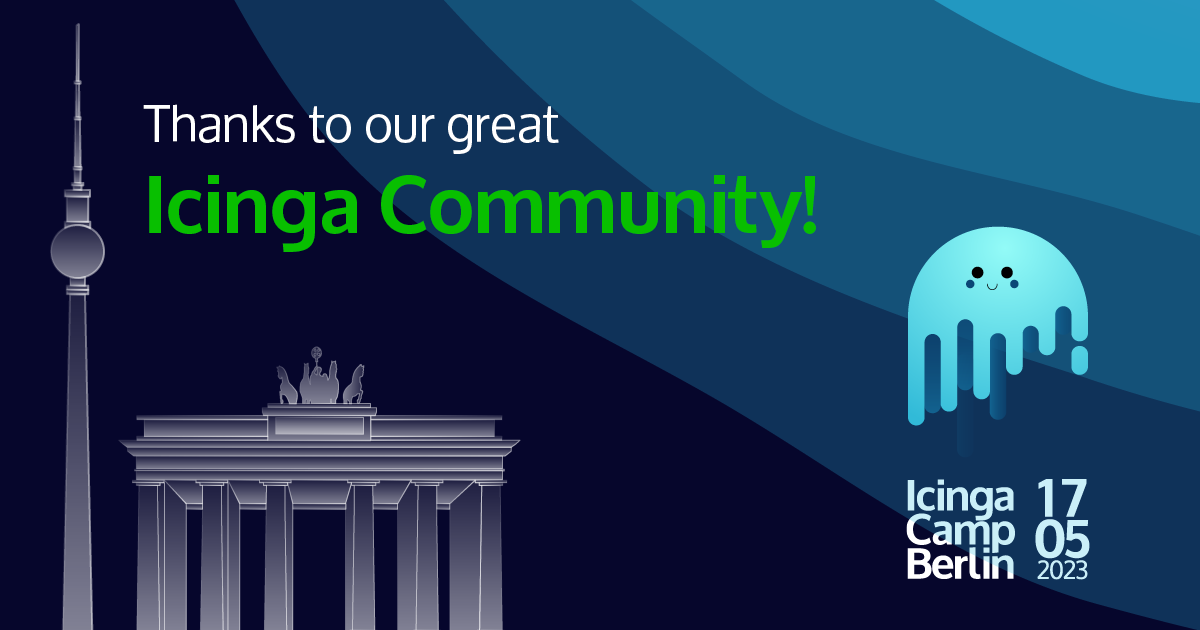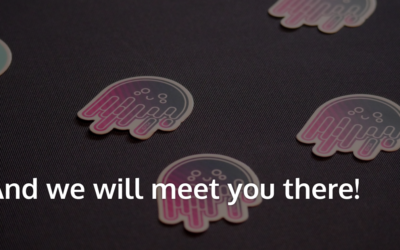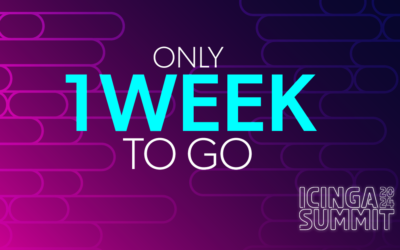It was a nice sunny morning, the weather really with us, for our Icinga Camp Berlin this year.
When I peeked outside after helping with the setup, people were already mingling, getting ready to check in and get their first coffee to prepare for the day ahead.
Bernd took the stage, welcoming everyone with genuine enthusiasm, setting the tone for what promised to be an engaging event. Surrounded by our community, I felt right at home – ready to dive into the talks and connect with new friends. With a cup of coffee in hand, I embraced the day to come.
The early morning
He kicked off the event with his talk Current state of Icinga. It provided a summary of all the news and updates from the recent months. Bernd went over various relevant developments, the different projects that have been worked on and the success stories that came out of them. We were brought up to speed on all the latest happenings.
Next up was a talk that highlighted an exciting initiative focused on rebuilding and upgrading the way incidents are handled in Icinga. The speakers introduced us to their plans on how they want to approach the topic, which included enhancements in contact management, streamlined configuration of notification rules, and improved accessibility through the user-friendly Icinga web interface. Throughout the session, they guided us through their concepts, showed us a demo, which highlighted the current state of development.
The two presenters of Upgrading Incident Management with Icinga were:
Johannes, the Lead Developer for frontend development at Icinga. He oversees all web-related projects and tries to make sure that the incident manager will have a user-friendly experience for Icinga users.
Julian, is the Lead Developer for backend development at Icinga. Armed with a Master of Science degree, he focuses on all backend-related tasks in the project, to ensure we will have a stable module!
I haven’t really had the chance until now to look into what they were cooking up, and attending this talk allowed me to gain a firsthand understanding of the initiatives undertaken by Johannes, Julian, and their teams. This left me, and evident by the amount of questions in the Q&A afterwards, many others excited about the future enhancements and the positive impact they will have on Icinga as a whole.
After the first coffee
Next up after the break was Nicolas Schneider showcasing his Module building Modules!
He started off by explaining how he got the idea of writing the module: the process of setting up a new module with basic functionality can be time-consuming, and sitting in front of an empty document to get started feels very daunting.
He introduced us to his Icinga Web module that leverages the icingacli to automatically construct the structure of a new module, allowing developers to focus on the more challenging aspects of programming. Nicolas showcased the current capabilities of the modulebuilder, which included features such as basic theming, an IndexController as a starting point, a single configuration page, a Multiconfig implementation using IniRepository, and essential PHP files.
Attending this talk left me very excited about how much easier it can be to get over the empty page syndrom and creating tailored modules to expand the Icinga universe.
Next up we had Robert Waffen demonstrate how he is Setting up Icinga in 15min or Less. He started by explaining the concepts of Puppet, which will help him get the installation done. Then he gave us an overview over the intended result and order in which he would start installing the different components: Icinga 2 + agents + web interface. And then we got to witness the live demonstration of how it all comes together!
In the last session before lunch Daniel Bodky, consultant at NETWAYS Professional Services, talked about The Times They Are A’Changing: Icinga 2 on Kubernetes – or how Icinga 2 can run on Kubernetes.
He explained the challenges of running a highly-available Icinga 2 ecosystem on traditional infrastructure and offered some solutions on how to make it work.
Daniel showed us how deploying the management plane to Kubernetes, leveraging its service discovery and self-healing capabilities works, even with a tool as complex and somewhat rigid as Icinga.
The session provided an overview of a high-availability setup of Icinga on traditional environments before showcasing the advantages of running the management plane on Kubernetes. Daniel also presented an early version of a Helm chart for this purpose that he and his colleagues have been working on.
The afternoon
After lunch Markus Frei reeled us back in with a showcase of Current status of the Linuxfabrik Monitoring Plugins. He is one of the co-founders of the Swiss company, a service provider for open source software and long-standing Icinga partner. The talk itself focused on what has changed in the last few months and what future developments are planned for the plugin collection. He showed how to configure them in Icinga Director and gave some insights under the hood.
After that I took over with my talk Connecting our Community: An Overview of Our Platform Ecosystem. From our social media platforms, our Icinga exchange, our GitHub repos and different meetups and events we organise – there are a lot of different ways you can participate in our community. With this talk I wanted to showcase the different uses of each platform and make the lesser known ones present in peoples’ minds.
Right after my presentation we jumped into our panel, which was on the topic of Viewing Icinga from different angles. The panelists were Icinga’s CEO Bernd, Linuxfabrik’s Markus Frei and Dominik Riva who I know from our community forum. With those three we were able to show how different projects and developments look from the perspectives of Icinga, an Icinga partner and from a user perspective. I really enjoyed moderating the discussion and the time flew by – until we got called off the stage for our next speaker:
Icingas CTO was up next to introduce us to the Sneak Peak: Icinga for Kubernetes! He talked about the process we made so far, learning about the platform, different ways to extract metrics for monitoring and visualisation, what this could look like and where this project might take us.
This was the second inside look into what we are currently working on, the project with Kubernetes is still very early in development, so we were happy to receive some valuable feedback!
The evening
This year we were finally able to get together an evening event with good conscience. It was situated only a few meters away from the location and we had a bar to get some drinks from, and the outside area for us. This created a nice no-worries athmosphere to network, chat about the learnings of the day and get some relaxation in before making the trip home. Later in the evening, for the people who stuck around, the venue had an open 80ies themed party which also was great fun – Berlin really knows how to get a good costume party going!
All in all, I was very happy with the day and having been able to host an event again. And what an incredible event it was! We appreciate each and every one of you for coming together in Berlin to share knowledge, network with the community and have a good time with like-minded people! We hope you were able to take home lots of insights. At this point, we would like to raise a toast to our sponsors, as we wouldn’t be able to pull off Icinga Camp the way we did. Thanks to NETWAYS, Linux Magazin and Hönscheid IT Consulting! We very much value your support and hope to be working together again in the future!




